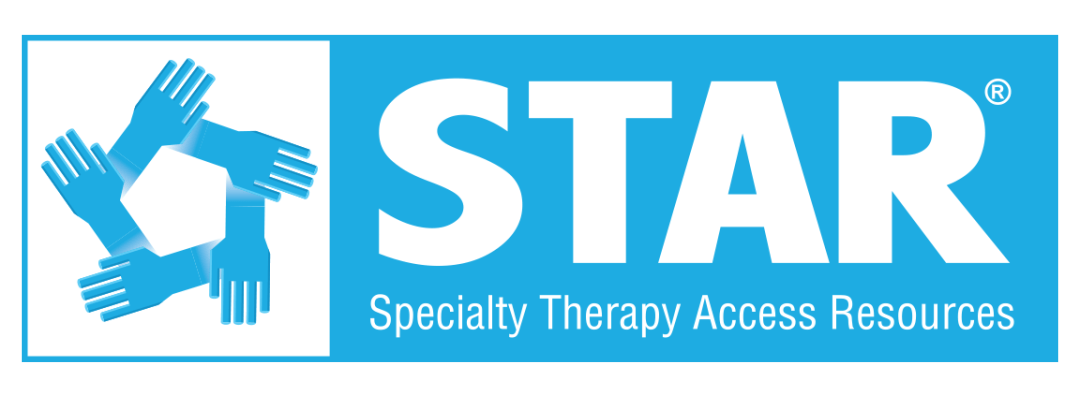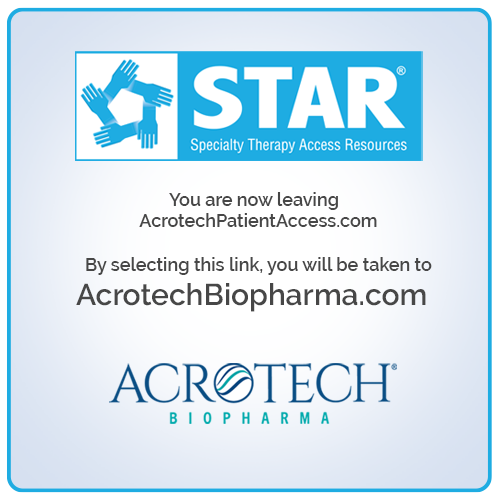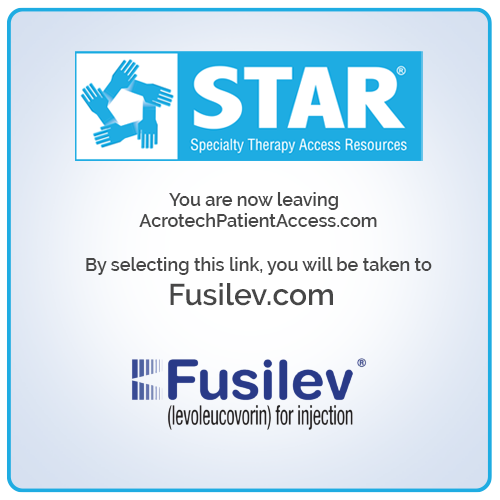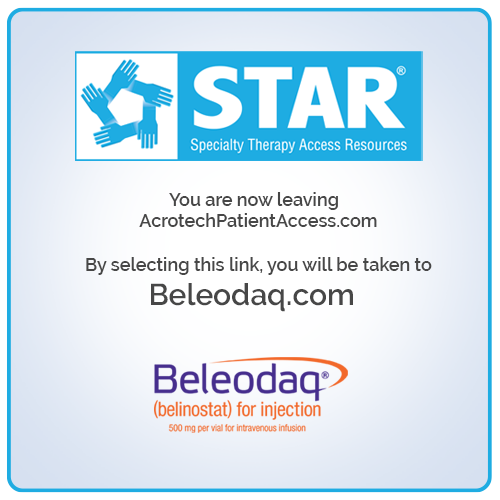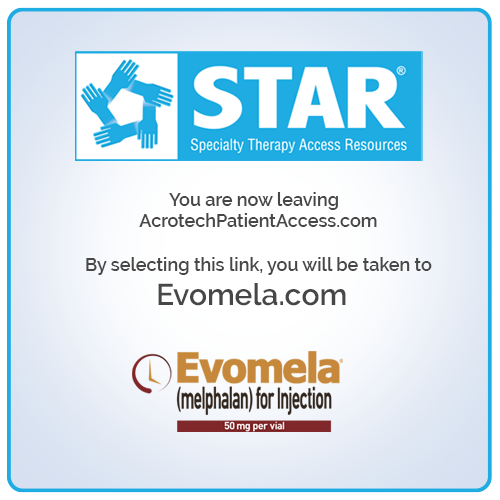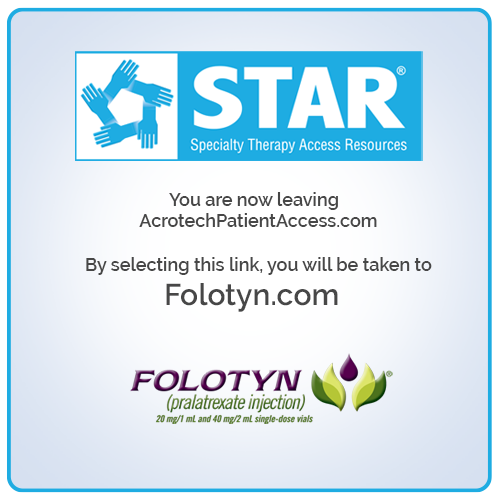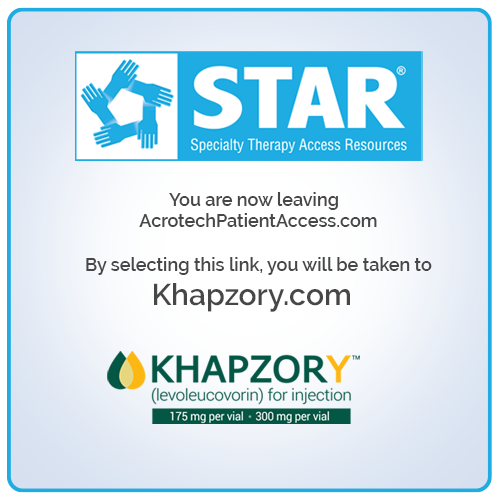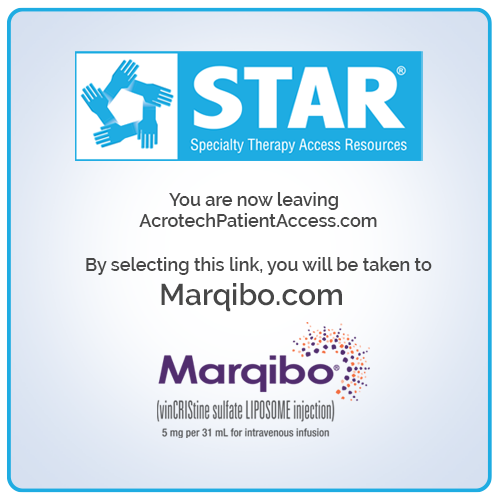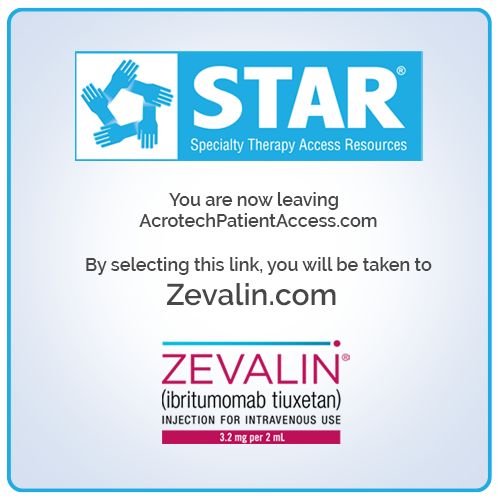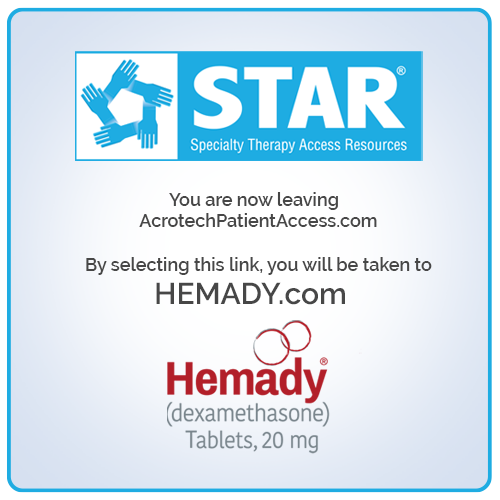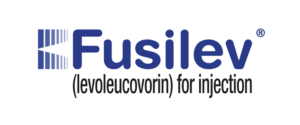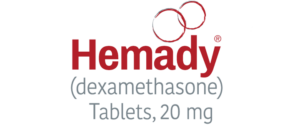Acrotech is committed to appropriate patient access to care.
This site is intended for U.S. Healthcare Professionals only
Contact STAR
Please fill out the STAR enrollment form and fax it to 1-866-930-1562 to request reimbursement, co-pay assistance, or PAP assistance. STAR reimbursement counselors may be reached Monday – Friday from 9 to 5 ET (excluding holidays).
Phone: 1-888-53-STAR7 (1-888-537-8277)
Fax: 1-866-930-1562
or fill out the form below.
Important Safety Information and Full Prescribing Information
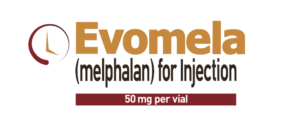
Important Safety Information for EVOMELA
WARNING: SEVERE BONE MARROW SUPPRESSION, HYPERSENSITIVITY, and LEUKEMOGENICITY
- Severe bone marrow suppression with resulting infection or bleeding may occur. Controlled trials comparing intravenous (IV) melphalan to oral melphalan have shown more myelosuppression with the IV formulation. Monitor hematologic laboratory parameters.
- Hypersensitivity reactions, including anaphylaxis, have occurred in approximately 2% of patients who received the IV formulation of melphalan. Discontinue treatment with EVOMELA for serious hypersensitivity reactions.
- Melphalan produces chromosomal aberrations in vitroand in vivo. EVOMELA should be considered potentially leukemogenic in humans.
Contraindications
- History of serious allergic reaction to melphalan.
Warnings and Precautions
- Bone Marrow Suppression: For patients receiving EVOMELA as part of a conditioning regimen, myeloablation occurs in all patients. Do not begin the conditioning regimen if a stem cell product is not available for rescue. Monitor complete blood counts, provide supportive care for infections, anemia and thrombocytopenia until there is adequate hematopoietic recovery. For patients receiving EVOMELA as palliative treatment, if the bone marrow has been compromised by prior irradiation, prior chemotherapy or is recovering from chemotherapy, the risk of severe myelosuppression with EVOMELA is increased. Perform periodic complete blood counts during the course of treatment with EVOMELA. Provide supportive care for infections, bleeding, and symptomatic anemia.
- Gastrointestinal Toxicity: For patients receiving EVOMELA as part of a conditioning regimen, nausea, vomiting, mucositis, and diarrhea may occur in over 50% of patients. Use prophylactic antiemetic medication. Provide supportive care for nausea, vomiting, diarrhea, and mucositis. The frequency of grade 3/4 mucositis in clinical studies was 13%. Provide nutritional support and analgesics for patients with severe mucositis. For patients receiving EVOMELA as palliative treatment, nausea and vomiting, diarrhea, and oral ulceration may occur. Use prophylactic antiemetics. Provide supportive care for nausea, vomiting, diarrhea and mucositis.
- Hepatotoxicity: Hepatic disorders ranging from abnormal liver function tests to clinical manifestations such as hepatitis and jaundice have been reported after treatment with melphalan. Hepatic veno-occlusive disease has also been reported. Monitor liver chemistries.
- Hypersensitivity: Acute hypersensitivity reactions, including anaphylaxis, have occurred in approximately 2% of patients who received an intravenous formulation of melphalan. Symptoms may include urticaria, pruritus, edema, and skin rashes and, in some patients, tachycardia, bronchospasm, dyspnea, and hypotension. Discontinue treatment with EVOMELA for serious hypersensitivity reactions.
- Secondary Malignancies: Secondary malignancies such as myeloproliferative syndrome or acute leukemia have been reported in multiple myeloma patients treated with melphalan-containing chemotherapy regimens. The potential benefit of EVOMELA therapy must be considered against the possible risk of the induction of a secondary malignancy.
- Embryo-Fetal Toxicity: EVOMELA can cause fetal harm when administered to a pregnant woman. Advise females of reproductive potential to avoid pregnancy during and after treatment with EVOMELA. If this drug is used during pregnancy or if the patient becomes pregnant while taking this drug, advise the patient of potential risk to the fetus.
- Infertility: Melphalan-based chemotherapy regimens have been reported to cause suppression of ovarian function in premenopausal women, resulting in persistent amenorrhea in approximately 9% of patients. Reversible or irreversible testicular suppression has also been reported.
Adverse Reactions
- The most common adverse reactions observed in at least 50% of patients with multiple myeloma treated with EVOMELA were neutrophil count decreased (100%), white blood cell count decreased (100%), lymphocyte count decreased (98%), platelet count decreased (98%), diarrhea (93%), nausea (90%), fatigue (77%), hypokalemia (74%), anemia (66%), and vomiting (64%).
- For myeloablative conditioning in multiple myeloma patients undergoing ASCT, twelve (20%) patients experienced a treatment emergent serious adverse reaction while on study. The most common serious adverse reactions (>1 patient, 1.6%) were pyrexia, hematochezia, febrile neutropenia, and renal failure. Treatment-related serious adverse reactions reported in >1 patient were pyrexia (n=2, 3%), febrile neutropenia (n=2, 3%), and hematochezia (n=2, 3%).
- In a randomized clinical trial studying the palliative treatment of patients with multiple myeloma, severe myelotoxicity (WBC ≤1,000 and/or platelets ≤25,000) was more common in the IV melphalan arm (28%) than in the oral melphalan arm (11%).
- In this randomized study, the rate of severe leukopenia in the IV arm in the patients with BUN over 30 mg/dL decreased from 50% (8/16) to 11% (3/28) after 50% reduction in IV melphalan dose. In addition, the incidence of drug-related death in the IV arm decreased from 10% (8/77) to 3% (3/108) after this dose reduction. This compares to an overall 1% (1/100) incidence of drug-related death in the oral melphalan arm.
Drug Interactions
- No formal drug interaction studies have been conducted. When nalidixic acid and IV melphalan are given simultaneously, the incidence of severe hemorrhagic necrotic enterocolitis has been reported to increase in pediatric patients.
Use in Specific Populations
- Lactation: It is not known whether melphalan is present in human milk. Because many drugs are excreted in human milk and because of the potential for serious adverse reactions in nursing infants from melphalan, breastfeeding is not recommended during treatment with EVOMELA.
- Patients with Renal Impairment: For palliative treatment, consider dose reduction for patients with renal impairment receiving EVOMELA. Bone marrow suppression has been observed in patients with BUN levels ≥30 mg/dL. A 50% reduction in the IV melphalan dose decreased the incidence of severe bone marrow suppression in the latter portion of this study.
Please click here for full Prescribing Information, including BOXED WARNINGS, for EVOMELA.
EVO-0246
Adverse Drug Reaction (ADR) Reporting: Please report all adverse events suspected to have a causal relationship with Acrotech Biopharma’s Products, using the contact number listed on each product’s package insert. Adverse events not associated with the use of Acrotech’s products, e.g., Disease Progression, or requests for discontinuing drug supply due to patient deaths not associated with the use of Acrotech’s Products, should not be reported as ADRs.
Acrotech Biopharma, Inc. does not guarantee coverage and/or reimbursement for its products. Coverage, coding, and reimbursement policies vary significantly by payer, patient, and setting of care. Actual coverage and reimbursement decisions are made by individual payers following the receipt of claims. Healthcare professionals should always verify coverage, coding, and reimbursement guidelines on a payer and patient-specific basis. Acrotech Biopharma, Inc. reserves the right to change eligibility guidelines, terminate, or modify the STAR program at any time for any reason.
© 2022 Acrotech Biopharma, Inc. All Rights Reserved. May not be reproduced, altered, or distributed without express permission. Acrotech Biopharma, Inc. and Specialty Therapy Access Resources are registered trademarks of Acrotech Biopharma, Inc. and its subsidiaries. The Acrotech Biopharma logo, and STAR logo are trademarks owned by Acrotech Biopharma, Inc. and its subsidiaries.
Privacy Policy | Terms of Use | Linking Policy | Trademark Policy
